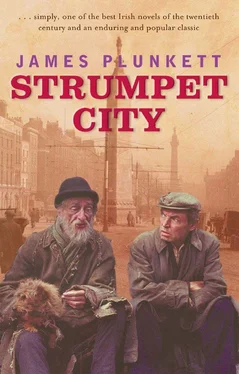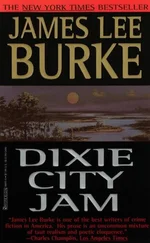As they walked Farrell said: ‘I won’t forget it to you for coming down for me.’
‘Who else would I call on?’ Fitz said, easily.
But he was shocked at the change in Farrell. He had not seen much of him since moving out to make room for Mary. Most of the time Farrell had been out searching for work. Or, if he was in, he had remained in his own room. He was not simply out of work. He was a marked man, barred by one stevedore after another, a man who had tried on his own to break a highly organised system of petty extortion.
‘You haven’t had any luck?’ Fitz asked.
‘Nor won’t,’ Farrell said.
‘What about Larkin?’
‘There’s been no word.’
‘Maybe there will be, soon.’
‘What can Larkin do, when the rest didn’t stand by me?’
Very little, Fitz thought. The shipowners gave each unloading job to the stevedore on contract. Who the stevedores employed after that, or how they paid them, was not the shipowners’ concern. The custom of paying the dockers in public houses had been accepted for years. It seemed impossible to Fitz that the lonely, elderly man walking beside him could alter it. There were too many who were jobless and willing to take his place. Farrell was beginning to look at it that way too. It had been painful to see his eyes light up at the prospect of a casual night’s work.
Farrell walked in silence for a while. Then he said, more hopefully:
‘What’s the foreman at the foundry like?’
‘Carrington is his name. He’s as hard as nails, but he has no favourites. All he cares for is a good worker.’
‘Does he job casuals often?’
‘Two or three times a week, usually for a day at a stretch.’
‘I’ll go out of my way to bring myself to his notice tonight,’ Farrell said. ‘I’m finished as a docker, anyway.’
They worked without rest through a night of continuing sleet and wind; the labourers digging and hauling, the carters loading, dumping, re-loading. Steam rose in dense clouds beneath the water from the hoses and fanned about the yard so that the sleet itself tasted of cinder and ash and the clothes of the labouring men smelled strongly and sourly. At last it became so dense that the men digging on the leeward side could work no longer. It had become impossible to breathe as the wind bent it downwards in an impenetrable fog.
Carrington, who was directing the carters, left off and came over to Fitz. It was a habit of his. Fitz was his unofficial deputy.
‘What now?’ he asked.
Fitz had been thinking about it. They had tried taking the hoses off for intervals and digging when the steam cleared. But when the hoses stopped the strong wind fanned the fire into life again.
‘We could try screening the fire and see if we can dig it out.’
There were large screens in No. 2 house, which were used in summer to cut off the heavy draught when both ends of the house had to be left open because of the heat.
Carrington felt it was worth trying.
Fitz gathered some labourers and half a dozen carters, one of whom was Mulhall. He set the furnace hands disassembling the screens so that the carts could carry them to the yard. While they were working Mulhall said to him:
‘Are you deputy gaffer here?’
‘No. Just senior hand.’
‘Union man?’
‘National Union of Dockers,’ Fitz said.
‘Same as us. Is the whole job union?’
‘Half and half.’
‘Ever met Larkin?’
‘No,’ Fitz said.
‘He fixed an overtime rate some time ago—ninepence an hour. It’s in the carters’ agreement.’
‘I wouldn’t know about that,’ Fitz said. He was a furnace hand. The carters had their own set conditions. Lately, one section or another of the carters was always in trouble.
‘Maybe you’d ask the head bottle-washer,’ Mulhall said, then backed up and drove off. They got the screens into position and after a while they shut off the hoses. The wind no longer had direct access to the fire, but it bundled over the top and caught the coal at its higher level. The steam too, was clear of the ground and the men could work in the lee of the stack. They loaded the carts without respite. Meanwhile other workmen had begun to dig towards the ignited coal. Fitz saw Farrell among them, working steadily and easily, the relaxed technique of the docker showing in every movement of his body. He was one of the small number selected by Carrington for a special and difficult operation. Fitz was glad. It would give Farrell hope—and for the moment hope had become his desperate need. Pat Bannister was among them too, working steadily, absorbed as he always was, in the job that confronted him. Further away, in among the general collection, Hennessy stood idle, with a long-handled trimmer’s shovel which was almost as tall as himself.
‘Don’t kill yourself,’ Fitz said as he passed him.
‘I’m a delicate framed man,’ Hennessy said, ‘and I’m crucified with rheumatism of the back.’
‘You’d better look as though you were working,’ Fitz advised him. ‘If Carrington puts his eye on you he’ll give you your papers.’
Hennessy sighed and dug his shovel into the coal.
The night passed slowly. As they grew exhausted it took on a dreamlike quality; the figures of men bent under the lamps; the sleet thickened and slackened, died and found new reserves; the scrape of shovels and the creaking of carts filled the darkness incessantly. For a while Fitz found himself beside Carrington and remembered Mulhall’s enquiry.
‘The carters want to know what’s the freight?’
Carrington thought and then said:
‘Sixpence an hour, I suppose.’
‘They seem to expect overtime rate.’
‘What’s that?’
‘Ninepence.’
‘My bloody eye,’ Carrington said.
His tone angered Fitz, but it did not seem to be the moment for argument. In the upper end of the yard a new coal-stack was rising as the men moved more and more coal.
‘Better keep them hosing as they build the new stack,’ Carrington said, ‘otherwise we may have another bloody fire on our hands.’
‘We’ll need the reserve water supply,’ Fitz said.
‘That’s all right. Go ahead and turn it on.’
‘Who’ll look after the hosing?’
‘There’s a couple of likely looking casuals. I’ll get one of them to take charge.’
Carrington’s eyes searched among the working figures. He walked over towards the group near him and singled out Farrell.
‘You,’ he said, ‘what have you worked at?’
‘Docker,’ Farrell said.
‘Name?’
‘Jim Farrell.’
‘Out of work?’
‘This past few months.’
Carrington hesitated. Then he said, dismissing Farrell, ‘All right, carry on.’
When Farrell had gone Carrington turned to Fitz.
‘I know who he is now. I couldn’t use him.’
‘Why not?’
‘Dangerous. That’s the fellow who tried to start some trouble with the stevedores.’
Carrington shouted again. ‘Hey, you,’ and another man approached.
‘I’ll turn on the reserve water cock,’ Fitz said.
Fitz climbed into the top gallery of No. 4 house where in a wing overlooking the river the reserve pump was located. The bare metal was painfully cold to touch and the wind, bullying fiercely through the glassless apertures, had almost scoured the floor clear of coal-dust. Fitz threw his weight against the release wheel. It was an unreliable piece of mechanism at the best of times.
He had carried the image of Farrell with him and the words of Carrington remained in his head as he waited. Farrell’s moment of rebellion was known now along the length of the dockside. They were going to hound him, even people like Carrington, who had no conscious determination to do so. It was a comfortless city.
Читать дальше












